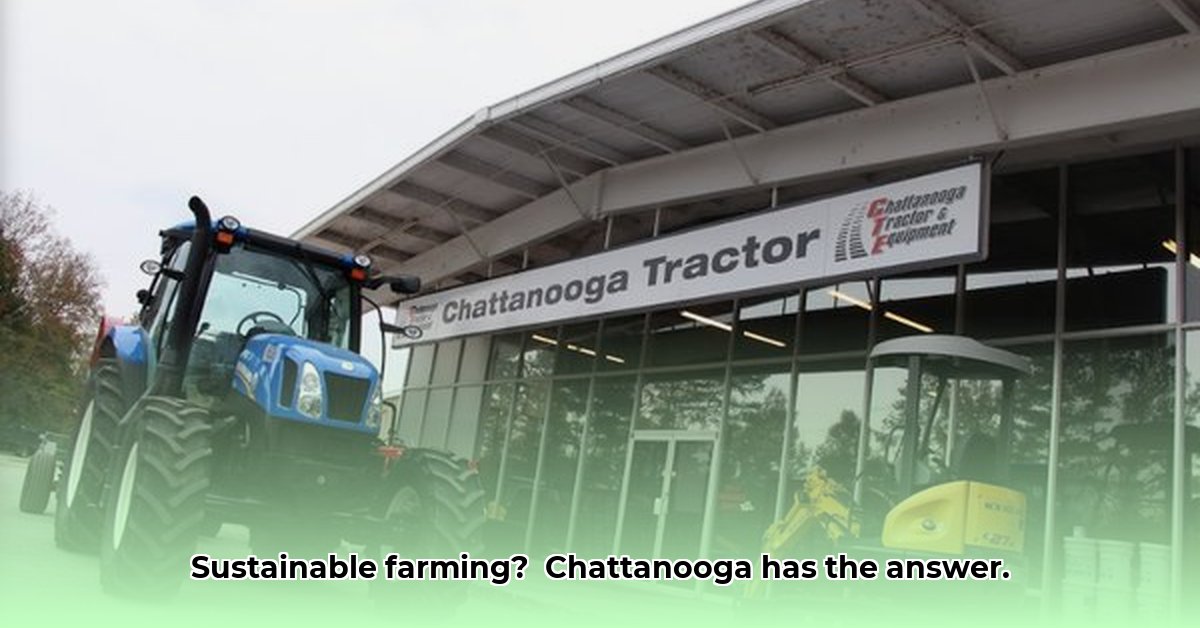
A Growing Green Future: How Chattanooga Can Lead Sustainable Agriculture
Chattanooga’s agricultural landscape is ripe for change. Facing rising fuel costs and increasing pressure to adopt environmentally friendly practices, local farmers are looking for solutions. One key player in this transformation is Chattanooga Tractor & Equipment (CTE). But how effectively is CTE helping farmers transition to sustainable practices? This guide examines CTE's current offerings, identifies areas for improvement, and proposes actionable steps for a greener future—a collaborative effort involving farmers, CTE, and government agencies. For more on choosing the right equipment, see our guide on tractor sizing.
Assessing Chattanooga Tractor & Equipment's Role
CTE offers a diverse range of equipment brands, including New Holland, Mahindra, and Yanmar—brands known for reliability and efficiency. This variety presents excellent potential for offering fuel-efficient and sustainable options to local farmers. However, a critical gap exists: a lack of transparent information regarding the specific fuel efficiency and environmental impact of their pre-owned inventory. Without detailed data on fuel consumption and emissions for used equipment, farmers struggle to make truly informed, sustainable choices. This lack of transparency hinders CTE's potential to be a true leader in sustainable agriculture within the Chattanooga region.
Actionable Steps: A Collaborative Path to Sustainability
Transitioning to sustainable agriculture requires a combined effort. The following steps outline specific actions for farmers, CTE, and government agencies:
Empowering Local Farmers
- Prioritize Fuel Efficiency: When purchasing equipment, prioritize models with demonstrably lower fuel consumption and emissions. Independent verification of fuel efficiency claims is crucial.
- Seek Training and Resources: Take advantage of available workshops and training programs on sustainable farming techniques. Effective use of equipment is key to minimizing environmental impact.
- Explore Financial Incentives: Actively research and apply for government grants and subsidies aimed at promoting sustainable agricultural practices. Financial assistance can significantly lower the barrier to entry for environmentally sound equipment.
- Embrace Precision Agriculture: Utilize technologies like GPS-guided machinery and data-driven decision-making to optimize resource use and minimize waste. Precision agriculture offers significant long-term cost savings and environmental benefits.
Transforming Chattanooga Tractor & Equipment
- Comprehensive Inventory Assessment: Conduct a thorough analysis of all equipment inventory, focusing on fuel efficiency (measured in gallons per acre or other relevant metrics), emissions, and overall environmental footprint. This detailed analysis must include both new and used equipment. Publication of this data will increase transparency and build trust.
- Targeted Marketing and Education: Develop marketing campaigns that clearly highlight the fuel efficiency and sustainability features of your equipment offerings. Go beyond simple specifications; showcase the long-term cost savings and environmental benefits. Offer educational workshops and demonstrations to train farmers on the most sustainable practices.
- Partnerships for Sustainability: Collaborate with local universities, agricultural organizations, and government agencies to expand your expertise and outreach. Joint initiatives will strengthen your commitment to sustainability.
- Expand Sustainable Equipment Offerings: Explore expanding your inventory to include cutting-edge sustainable technologies, such as electric or hybrid tractors. This proactive approach positions CTE as a leader in advancing sustainable agriculture.
The Government's Crucial Role
- Financial Incentives: Implement substantial financial incentives, such as grants, subsidies, or tax credits, to encourage farmers to adopt fuel-efficient equipment and sustainable practices. This targeted support makes green initiatives economically feasible for farmers.
- Investment in Research: Fund research and development into sustainable technologies and practices relevant to Chattanooga's unique agricultural context. This includes supporting innovation in fuel-efficient equipment and sustainable farming techniques.
- Infrastructure Development: Invest in robust infrastructure—such as irrigation systems, transportation networks, and reliable broadband access—to support efficient and sustainable food production. Improved infrastructure reduces waste and increases efficiency.
- Supportive Policy Framework: Develop policies that actively promote sustainable agriculture, incentivize eco-friendly practices, and regulate environmentally harmful ones. A clear policy framework is essential for guiding the transition.
Addressing Challenges: Building Resilience
The transition to sustainable agriculture presents challenges. High upfront costs for new equipment and uncertainty surrounding the condition and fuel efficiency of used equipment are significant hurdles. Mitigation strategies include:
- Government Subsidies and Financing: Make sustainable equipment more affordable through direct financial assistance and attractive financing options.
- Transparent Pre-Owned Equipment Assessment: Implement rigorous inspections and certifications for pre-owned equipment, providing detailed reports on condition and fuel efficiency. This builds trust and transparency.
- Educational Programs and Resources: Invest heavily in training and educational programs, empowering farmers with the knowledge to adopt and maintain sustainable farming practices.
A Shared Vision: Chattanooga's Sustainable Agricultural Future
The future of Chattanooga's agricultural sector depends on a collaborative, multi-faceted approach. By working together, CTE, farmers, and government agencies can overcome challenges, embrace innovation, and build a thriving, environmentally friendly agricultural landscape. This collective effort will not only ensure a healthier environment but will also foster a more economically and ecologically resilient agricultural sector for generations to come. The question of how to improve sustainable farming practices in Chattanooga is not simply a question of finding fuel-efficient used farm equipment; it is a question of building a resilient, collaborative future.